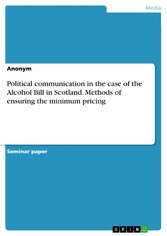Suchen und Finden
Service

Political communication in the case of the Alcohol Bill in Scotland. Methods of ensuring the minimum pricing
Verlag GRIN Verlag , 2021
ISBN 9783346325273 , 11 Seiten
Format PDF
Kopierschutz frei
Geräte
Mehr zum Inhalt

Political communication in the case of the Alcohol Bill in Scotland. Methods of ensuring the minimum pricing
Seminar paper from the year 2012 in the subject Communications - Public Relations, Advertising, Marketing, Social Media, grade: 1,3, Queen Margaret University, language: English, abstract: This paper focuses on the Alcohol Bill in Scotland, and especially on the proposal of a minimum price per unit of alcohol sold, which is one of the provisions in the Alcohol Bill. This analysis aims to show, how different key actors tried to influence MSPs' decision in favour of minimum pricing by portraying different strategies which were used in this debate. On November 25th 2009 the Alcohol (Scotland) Bill, which is defined by Scottish government as a package of measures to reduce misuse of alcohol and the harm caused by it in Scotland, was introduced to the Scottish Parliament by SNP's deputy leader Nicola Sturgeon MSP, who also held the post of Cabinet Secretary of Health and Wellbeing. First of all it is important to explain why the debate about the provision of minimum pricing is a crucial process within the Alcohol Bill. Despite the logical explanation of the benefits of this provision for social health as well as for Scotland's budget and the strategic usage of evidence, which will be explained in detail later, the provision was surprisingly not implemented due to the rejection of the oppositional parties. In this context the question arises of how a provision, which had the needed backing from diverse institutions and stakeholders, had to yield to the pressure of the oppositional parties. However, this work will only briefly outline possible processes which might have had an impact on the final decision. The main objective of this work is to describe the methods which were used to ensure the minimum pricing rather than to investigate why the provision was not passed.
Shop

